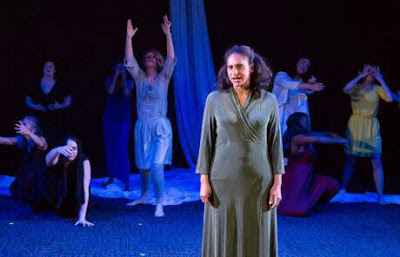‘The Trojan Women Project’ explores knotty cultural issues
 |
| Lisa Hill-Corley as Betty in “The Trojan Women Project.” [Claire Kimball] |
By David Siegel
Brave Spirits Theatre adds its distinctive style to the Women’s Voices Theatre Festival with “The Trojan Women Project.” It is a singular event. The play is packed with moments of dramatic sizzle from verbal and physical pokes and prods, along with striking flashes of sinewy poetry. It’s surrounded by grounded, bracingly delivered monologues exploring knotty cultural and political issues of the here and now.
“The Trojan Women Project” appears through Feb. 25 at the Convergence Studio Lab Theater in Alexandria.
The newly devised play takes off from the solid bones of Euripides’ Greek classic, “The Trojan Women.” Brave Spirits transports the original Trojan War underpinnings to today’s Washington, D.C., just after the 2016 presidential election.
The result of the election “was a turning point in the creation of the play,” wrote playwright and director Rachel Hynes in her program notes. “We looked at the war on women in America and decided that this was our Trojan War.”
Brave Spirits “intentionally mined personal circumstances and paired them with specific historical events and universal experience while being mindful of voices that have historically been undervalued, misrepresented, and hidden,” said dramaturg Laura Esti Miller.
The production is organized as a number of short episodes that bear witness to current events through the individual fears, dreams, and hopes of 13 characters.
At first, the issues range from toxic masculinity, control of women by men, domestic violence, the limited horizons that some women face, and the question of who governs their own bodies. A paralysis from fear that the Trump Administration will take painful, harmful actions is palpable.
As “The Trojan Women Project” progresses, the issues probe into more complex territory. Former allies begin to disagree about desired directions and outcomes. They are no longer united by a common enemy: toxic men and fear of the Trump Administration.
The play catches major dramatic fire as the characters take on heated debate as if in a conflagration of flames. There is rich debate about neighborhood gentrification, class and race, sexuality, immigration, motherhood, and ageism, as well as conflict between white privilege and working-class people of color.
The first thing the audience witnesses are the cast members strewn about the floor of the Convergence Theater. They are motionless figures, as if either frozen or constricted in death wrapped around chairs and themselves.
There is projected commentary of two “know-it-all” men intoning that they had unearthed a great discovery: the previously unknown graves of Trojan Women and one male. Slowly each of the cast members comes to life. At the rear of the theater space, projections about historical events begin to appear.
Each of the 13 ensemble members dramatically steps into the spotlight with mannerisms of iconic women from the recent past – Eartha Kitt, Marilyn Monroe, Katherine Hepburn, Janis Joplin, Angela Davis, June Cleaver, and Ruth Bader Ginsburg to name a few. Then the production pivots to a quick journey into some of the historical roots of women’s descent into submission with the apparent acceptance of a male-dominated society.
As the first act ends, “The Trojan Women Project” pivots into more incendiary territory; heating up with theatrical oomph, accomplished confrontational interactions, and a myriad of intersections as characters bring to the fore a different agenda based upon who they are beyond being female.
With its large cast and its numerous scenes, it is unfair to parse out praise for specific acting or spotlight certain scenes. You likely will have your own highlights. With that said, several actors stood out: Renea S. Brown (Reagan) and Nicole Ruthmarie (Nefertiti). They were mesmerizing as they argued from their perspectives on how to succeed in life. Over time, they come to learn they are not so far apart in being invisible to those who are not people of color. They each learn in their own time how others define them, and who are “mad” at depends on their own circumstances.
Even a Miss D.C. may fall short in life when things get tough. A conflagration when one has nothing to lose can make perfect sense. And then there is Lisa Hill-Corley (Betty), who grabbed my attention like a magnet and never let me go.
In one scene that stuck with me, the entire ensemble dramatized the absolute terror of domestic violence with a formation of the 13 cast members protecting one another while looking over shoulders to see if “he” is stalking.
“The Trojan Women Project” has a cadence of merged voice and movement. It is a constant intertwining of the aural and the visual. Under director Hynes’ approach, the large cast moves effortlessly through a maze of chairs and the audience.
It is a forceful, intriguing work of political and cultural performing arts for any audience. “The Trojan Women Project” left me with bottomless questions as the recrimination of “how could you?” swept over the production. The notion that “we’re all in this together” began to waver, as the characters found there is no common agreed-upon foe. Each audience member gets to decide for themselves.
Where and When: “The Trojan Women Project plays through Feb. 25 at the Lab at Convergence Theatre, 1819 North Quaker Lane, Alexandria. Shows are 8 p.m. on Wednesdays, Thursdays, Fridays, and Saturdays; 7 p.m. Sundays; and weekend matinees. Purchase tickets online.
This article is based on a review by David Siegel in DC Metro Theater Arts.


“toxic masculinity, control of men by women”…
I don’t want to diminish that these can be real issues, especially in the corporate/job world, but man if this playwright had met my mother, they’d be writing a play about the platonic dominatrix who does not allow any men to have opinions that differ from her own.